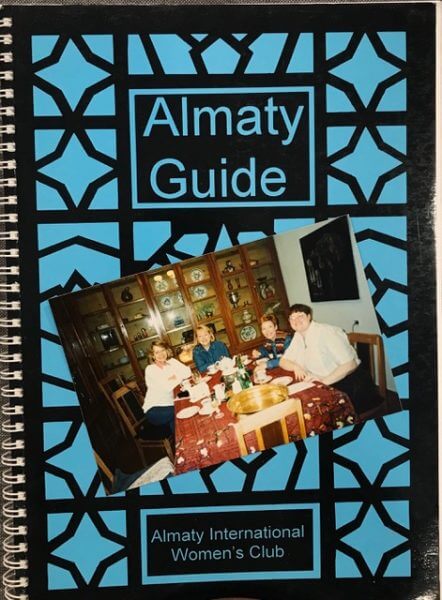#31: Almaty, Kazakhstan, 1995 Chronicles, Part 2
By the time October rolled around, we were pretty much settled in our renovated “dacha” in Almaty. We’d survived a couple health challenges, got work projects off the ground and started having some fun, including a visit from my 85 year-old Dad, touring the wonders of Tashkent, Samarkand and Bokhara. These adventures filled the second half of “The Sunshine-Swing Chronicles,” written in response to inquiries from friends about how we were doing. Here are some representative excerpts.
[Click on photos to enlarge.]
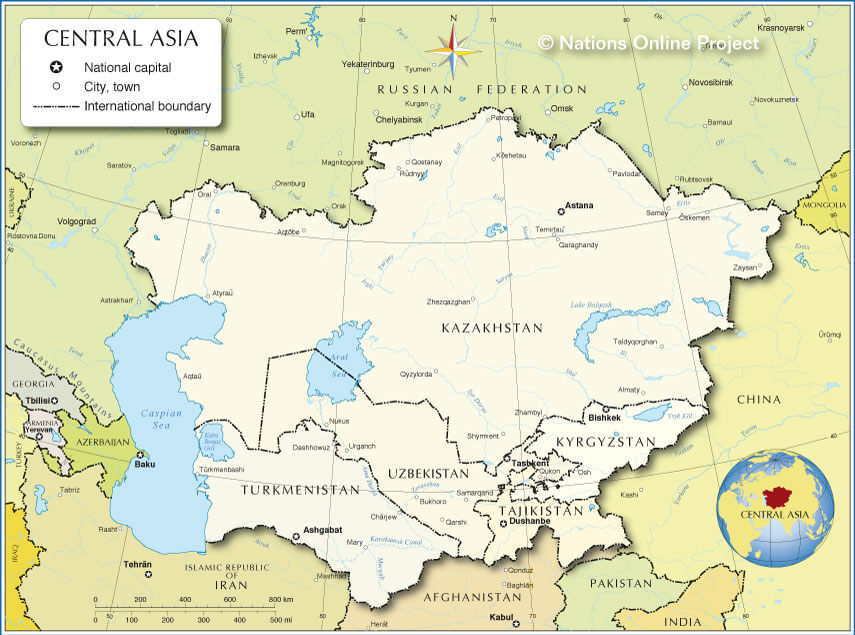
At the time we lived in Kazakhstan, the capital was Almaty (SE corner of country).
HEALTH
We’ve been blessed with mostly good health, a touch of flu or a cold now and then, some tummy problems off and on, but nothing serious. But we did have two close calls on the accident front, as revealed in quotes from our weekly family letters:
5/4/95
This has been a magical day. It started with what could have been a serious accident and med-evac to Germany but ended full of awe and beauty.
I went with Sasha, my driver-on-call (not the landlord; that’s another Sasha) to attend a goodbye lunch for friend Jill who’s about to leave Kazakhstan. Sasha pulled over to the curb, and I jumped the ditch — like most Asian cities, Almaty has wide, deep ditches on either side of the street, in this case, c. two feet wide by two feet deep. Instead of flying through the air as usual, I fell hard against the sharp concrete edge of the far side.
Excruciating pain. Sasha came sprinting to pick me up, but I laid a hand on his arm and said, “Nyet, nyet.” I didn’t want to move until we had a better understanding of how bad it was. Jill came running with her husband. We lifted my skirt, took off the shredded hose and saw a pretty awful sight — four goose-eggs, a swollen ankle, serious scrapes, all accompanied by this awful pain.
Jill’s husband had a first-aid kit in his company van, but it had been used recently, so the crushable cool-pack and wound-cleaning materials were finished. At that point, the pain subsided to a dull roar, and I decided the best thing was for Sasha to drive me to Russell’s office where there should be a first-aid kit and where there definitely was a phone so we could call Dr. Bassett, the American who tends expatriates. On the way, I gulped two Advil from the pill box I always have in my purse.
Poor Sasha kept apologizing as if it were his fault that I was stupid enough to try to jump a ditch in a skirt instead of my accustomed trousers. When we got to Russell’s office, Sasha went upstairs to get Russell and Roza, R’s office manager and a real treasure. (No lift, so I stayed in the car.) Roza brought water and a towel to help me clean off the worst of the dirt and grime. Then Russell went back up to call Dr. Bassett.
Roza asked if I would like to have Valodya look at it. This is a different Valodya from the one I’ve already written about. This Valodya is a project driver who has a reputation as a shaman and faith-healer. I figured it couldn’t hurt. I like Valodya and trust him, plus I’ve lived in the Third World long enough to know that there is often something to traditional folk medicine. Besides, he wasn’t going to prescribe, just examine.
It was truly amazing. I was sitting in the front passenger seat with my leg on the driver’s seat. Valodya slipped onto the edge of the driver’s seat, concentrated for a moment and then slowly ran his hands through the air an inch above the injury. I felt a coolness and a relief from pain as his hands passed from just below my knee to over my ankle. I read recently that some U.S. nursing schools are starting to teach laying-on of hands as an adjunct to modern medicine and that nurses so trained are able to ease the pain of the terminally ill. I could feel that happening to me. Valodya reported that he sensed no breaks, that it would continue to be painful for some days and then I would start to feel better. That’s what Dr. Bassett also said when he showed up two hours later and completed a rather painful examination. Dr. Bassett charged $75, while Valodya did it for free because he believes he has a gift from God. Who’s to say which form of examination is better? All I know is that it was a very humbling experience.
By the time Dr. Bassett arrived, Sasha and Russell had helped me up the three flights of stairs to the office, so I could wait for the doctor with a bit more comfort and privacy. I was better able to clean the wounds (including a couple shallow puncture wounds in my hand) and have some lunch and tea which did no end of good. Russell brought an ice tray out of the fridge, and we wrapped the cubes in a towel with the result that the goose eggs came down quickly to just a little puffiness here and there.
Dr. B suggested that I go home, scrub out the wounds more, put on a light covering of Neosporin and a gauze bandage. So off I went with project driver Nouriq to buy the gauze and tape, because we weren’t sure if those things had got unpacked at our house yet. (Sasha had been excused with many thanks because we had so many drivers at the project office.)
Nouriq drove us up to Republic Square, where there’s a very good drug store. He started to go in with a note from Roza, but he discovered it was closed for lunch (usual here — everything closes at mid-day), so he came back to the car empty-handed. Suddenly, he looked through the wind screen and got very excited. “Nensi, Nensi, look please!” Off in the distance I could see a lot of military helicopters flying in formation. Nouriq jumped out of the car, and I craned my neck to see. They went right over us, the first helicopter flying the Kazakhstani flag below the fuselage almost at tree-top level. Then came Russian-manufactured gunships which I’d previously seen only in movies. They really are impressive.
Nouriq came running to where I was sitting in the back seat with my leg elevated. “Nensi, Nensi, get out please!” He grabbed my shoes and helped me to my feet just in time for a military jet formation going over at low altitude. Then one of the jets peeled off and performed a lot of impressive acrobatics, flying upside down, twisting and turning. At times it was so low that I could feel the vibrations of the jets in my whole body. (I had my fingers in my ears.) We’d happened upon the rehearsal for the big show later in the week, when all the former Soviet Union celebrates Victory Day (i.e., victory over the Nazis in WWII). It was really spectacular, worth the wait to get the bandages and worth getting out of the car in my awkwardness. I’m sure we saw it much better than we ever could have on The Day. We were almost exactly where the President and the bigwigs will be on the holiday.
On we went to another drug store which was open but which only had the gauze and not the tape. Then to another which didn’t have the tape but did have a light elastic contraption designed to hold bandages on limbs. As you know from previous paragraphs, this shopping experience, whether for stoves or bandages, is common in Almaty.
During Nouriq’s last trek to a drug store, a sharp wind came off the mountains just above the city. Suddenly the air was full of whirling gold coins, so many that I really couldn’t see very far. The wind had dislodged millions of gold, flat, round seed pods which were whirling through the air like a fairy snow storm. I felt such a sense of awe, like I’d seen something truly magical.
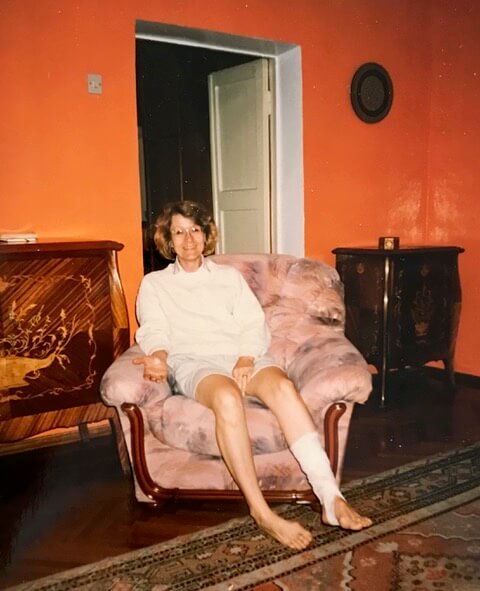 We arrived at our house just before the rain hit. The wind had been its herald, and after three months in Kazakhstan, we finally had a rain, a beautiful rain. A cleansing rain, a growing rain, a rain that made me appreciate what water means in a parched environment.
We arrived at our house just before the rain hit. The wind had been its herald, and after three months in Kazakhstan, we finally had a rain, a beautiful rain. A cleansing rain, a growing rain, a rain that made me appreciate what water means in a parched environment.
Tonight, I’m not in much pain unless I bend my leg in a funny way or brush it against something. I think the combination of Valodya’s faith-healing, the flight of the Kazakh Air Force, the shower of gold coins and the first spring rain have practically cured me. Now, wasn’t that a lucky day?
5/18/95
Our party for Russell’s staff was a grand success, but it ended on a more dramatic note than we might have liked.
Virtually everyone came with their families. We had shashlik (the local shishkebob) and bishbarmak (the Kazakh speciality of stewed horse meat over wide noodles), as well as potato salad, eggplant salad, cole slaw, almond nut bars and apricot meringue bars. Kazakhstani friends made the traditional dishes, and I did the rest.
The shashlik was cooked on a traditional grill which we’d had made. A special aromatic wood called saksaool is first burned in the higher part which is like a three-sided chimney. Then it’s spread out on the longer, flatter part with the skewers laid above on a metal grid. In no time at all, you’re eating charcoal-grilled lamb kebobs which have been marinated overnight in wine and herbs. Yummy!
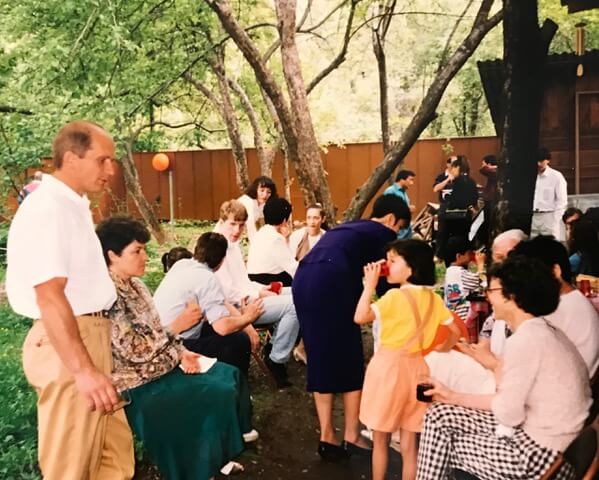 We served buffet-style, a novelty for most of the guests, who were both fascinated and enthusiastic. The local custom is to serve a formal, sit-down meal which can last as long as three hours. People are urged to eat dishes they may not care for and definitely to eat more than they want. Our guests liked the freedom of the buffet style, and one woman asked if she could copy it! I assured her it wasn’t my idea, and she was free to try it for herself.
We served buffet-style, a novelty for most of the guests, who were both fascinated and enthusiastic. The local custom is to serve a formal, sit-down meal which can last as long as three hours. People are urged to eat dishes they may not care for and definitely to eat more than they want. Our guests liked the freedom of the buffet style, and one woman asked if she could copy it! I assured her it wasn’t my idea, and she was free to try it for herself.
Unfortunately, all parties end with cleanup. I was washing glasses when I heard Russell call out from the bathroom. I found him leaning over the sink, dripping blood. He’d been removing the remaining drinks from the ice-filled bathtub when one of the fragile Chinese beer bottles broke and cut his finger. When I say “cut,” I mean CUT. We rinsed it off and immediately saw that it was too serious for a bandaid. (Later, when I came back to clean the bathroom, I found blood splattered everywhere.)
I phoned Dr. Bassett, who, God love him, came out on a Sunday night and sewed up Russell’s wound in the kitchen. R had severed a couple small arteries and a bunch of nerves. Dr. B said that if Russell had done a bit more, he’d have sent him to a surgeon, but he thought we could handle it at home (much to be preferred, given the state of local hospitals). I brought a strong lamp from my study, and we set up a sterile field on the kitchen counter. Dr. B numbed the finger with a series of injections and closed the wound with 11 stitches, me assisting as best I could.
It’s too soon to tell what the long-term prognosis will be in terms of loss of sensation, but Dr. B seemed quite pleased with Russell’s checkup yesterday. There’s no infection, the wound is healing nicely, and there’s some sensation already. We’ll just have to wait and see. Since it’s his baby finger on his right hand, and he’s left-handed, he cut the best finger he could if he had to cut one. The stitches will most likely come out next Monday, and then we’ll see where we are.
As I write these Chronicles, I’m happy to report that we both fully recovered from our klutziness. My shin’s still a bit sensitive, and Russell’s pinky is puffy, but we’ve survived to dine out on the tales.
MY WORK
Thanks to all who’ve asked how I’m managing to combine work with being a “dependent spouse” again.
I came out here with the intention of polishing my novel based on our experiences in Vientiane and starting a new one located in the mythical country of Nuristan, growing out of my experiences in Afghanistan, Pakistan and perhaps Kazakhstan, depending on what happened here. On no account was I going to get involved in producing another guide as I had in Vientiane. The first week I arrived in Almaty, a rep from the Almaty International Women’s Club asked me to work on the first edition of an Almaty guide. I explained my agenda and politely declined. They kept after me, and against my better judgement, I finally agreed, feeling that my volunteering had the potential for a mutual win-win. They had no one with experience producing such a guide, and I knew nothing about Almaty. If others would do the research, I could learn and teach at the same time.
I won’t bore you with month-by-month excerpts from the weekly family letter. Suffice it to say that it was as difficult as I had anticipated and far more destructive. We ultimately had over 20 volunteers from a variety of nations gathering data, writing first drafts, selling advertising, etc. I functioned as editor. There were a lot of strong personalities on the Guide Committee, each with her own well-fought agenda. Our target date for publication was early summer, but that was repeatedly postponed. Producing a proper guide for a city this large takes lots of time to gather the information, digest it and put it into a useful format. All this was wearing but not crushing.
The destructive blow fell two days before we were finally to go to press. All the data had been gathered. The book had been written, repeatedly re-written and proofed. I was making corrections based on the proofers’ suggestions and preparing the final draft, just as one of the club founders was feeling her power slip. Her little group that used to gather for tea now included members from many more countries and lots of women with leadership abilities. The founder seized upon the Guide as a way to re-establish dominance. She stacked a weekly meeting (which I was too busy to attend) with her supporters, manipulating everyone into a fever pitch over fears the Guide was insensitive in its discussion of what it’s like to live in Almaty. The result was that we had to submit the Guide to a committee who would read it and give suggestions for making it less insensitive. The “sensitivity committee” met, read and pronounced the Guide “Wonderful! We had no idea!” etc. etc.
Because of this delay, we lost our printer, who had previous commitments and couldn’t accommodate another rescheduling. After a long search for another printer in-country and in-region, we finally had to send the book to Istanbul for printing. This holdup meant I couldn’t oversee production of the Guide, because R&I were scheduled to leave on vacation. The women who accepted this responsibility spent only one-and-a-half hours reviewing the printer’s proofs, so the Guide ended up with many, many format problems. This was awfully discouraging, because I’d worked literally for weeks to create a professional-looking Guide.
Well, what’s done is done. The Guide is out. Almost 1000 copies have been sold in the first two weeks. Everyone is praising its contents, and most folks don’t see all the formatting glitches. Thank God it’s over, and thank God it’s successful. Russell has promised to tie me to the mast and plug my ears if ever another guide-editorship calls. Now I’m off to polish my Vientiane novel, with a newly painted and cleaned-up office to do it in!
FUN AND GAMES
We’ve had the good fortune of pleasant times with local and expatriate friends, visitors and trips around the region.
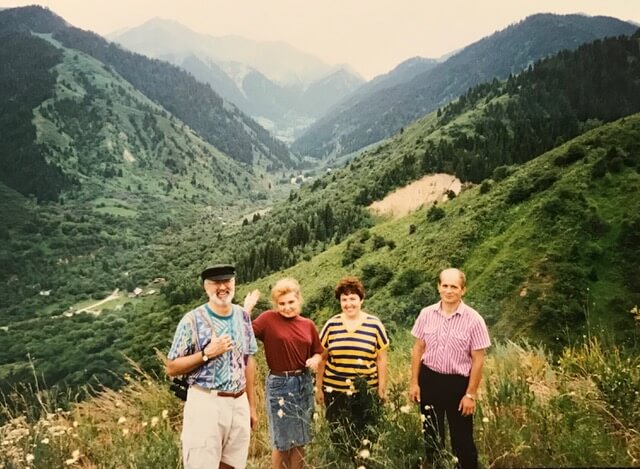
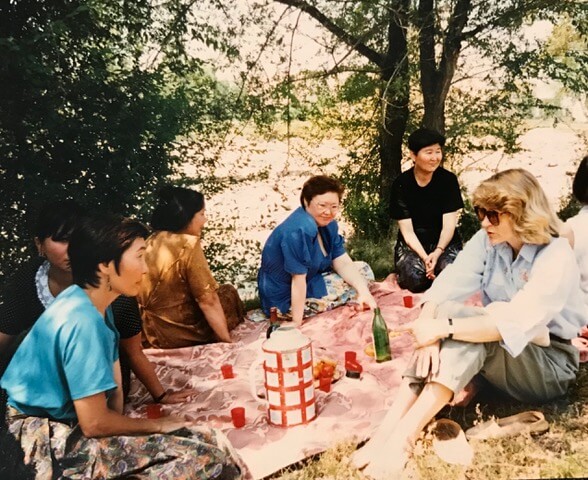
Computer engineer Valodya and his family have become good friends, and we’ve had many trips together into the mountains to pick barberries for his famous fall wine or just to reach a glacial lake and have a picnic. Roza and her extended family have made us one of their own, and we’ve had many happy times picnicking by the Talgar, celebrating birthdays or just getting together for the fun of it. When Dad was here, we all went to the Circus together, and if you haven’t been to a Soviet-style circus, you ain’t seen nothing yet! All these folks are highly educated. Valodya and Dad really seemed to hit it off, talking engineer-talk across the language barrier.
 I’ve been blessed with a husband-and-wife team as part-time driver and part-time housekeeper who have also become our friends. Sasha the driver was a supervisor, and Nadia, his wife, is an accountant. It greatly saddens us that all these talented people have to take menial jobs to make ends meet during these difficult times, but we feel lucky to have them in our lives, not just because of their work, but more importantly because of their kindness in welcoming us into their lives.
I’ve been blessed with a husband-and-wife team as part-time driver and part-time housekeeper who have also become our friends. Sasha the driver was a supervisor, and Nadia, his wife, is an accountant. It greatly saddens us that all these talented people have to take menial jobs to make ends meet during these difficult times, but we feel lucky to have them in our lives, not just because of their work, but more importantly because of their kindness in welcoming us into their lives.
We’ve made expatriate friends too: not only reuniting with folks from previous life-chapters but also making new ones. Our difficulties on the Guide have consolidated friendships among the six women who really hung in there, and we’ve nurtured other new relationships from Russell’s work-contacts.
Almaty is a crossroads for many arts. As I write this, we are in the midst of attending the ballet every night, featuring celebrities of the Bolshoi along with local talent. We have concerts, opera and folkloric productions, plus the Voice of Asia music festival in the foothills above Almaty. We’ve been entertained by all sorts of local festivals, including Narouz, the celebration of Persian New Year. The arts-and-crafts scene is pretty spectacular, too — rugs and carvings and metalwork and jewelry, to mention a few.
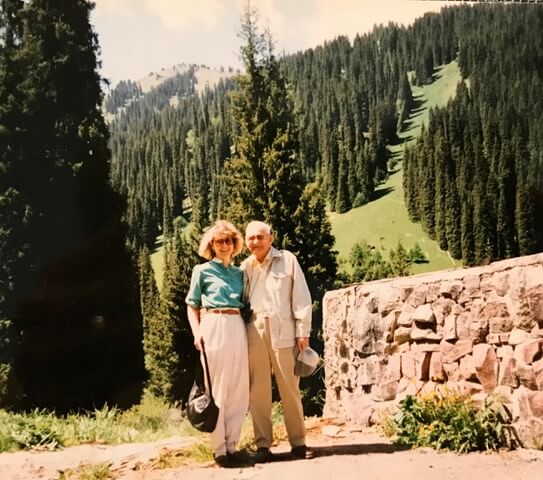 We had a truly fine visit with Dad. At 85, he’s still hale and hearty and full of wonder at the world. This year, after trips to Antarctica and Great Britain, he came out for the better part of June. We not only toured the sights of Almaty plus the nearby mountains and steppes; we also went to Tashkent, Samarkand and Bokhara. We three flew to Tashkent to start our tour, traveling by car and driver to the other cities and back. Russell then had to return by plane because of time-pressures at work. Sasha met Dad and me in Tashkent and drove us back to Almaty, so we two ended up seeing 1000 miles of the Silk Road. What we hadn’t anticipated was how beautiful this part of the world is in early summer. The melting snows fill the rivers, feed the wildflowers and toss puffy clouds into the skies.
We had a truly fine visit with Dad. At 85, he’s still hale and hearty and full of wonder at the world. This year, after trips to Antarctica and Great Britain, he came out for the better part of June. We not only toured the sights of Almaty plus the nearby mountains and steppes; we also went to Tashkent, Samarkand and Bokhara. We three flew to Tashkent to start our tour, traveling by car and driver to the other cities and back. Russell then had to return by plane because of time-pressures at work. Sasha met Dad and me in Tashkent and drove us back to Almaty, so we two ended up seeing 1000 miles of the Silk Road. What we hadn’t anticipated was how beautiful this part of the world is in early summer. The melting snows fill the rivers, feed the wildflowers and toss puffy clouds into the skies.
If you haven’t experienced the glories of Tamlerlane’s capital with its monumental mausoleums, mosques and madrassas, then you’d better come see for yourself. If you haven’t walked through Bokhara’s streets which have remained the same for a thousand years, then you’d better come. If you haven’t seen where Avicenna advanced the practice of medicine far beyond anything that Europe currently knew or where Ulugh Beg pushed the study of astronomy so far that threatened powers killed him, then you’d better come. If you haven’t climbed over the passes to the cerulean blue of Lake Issykul or ridden a camel across the steppes or a horse along high mountain trails, then you’d better come. Yes, you’d better come.
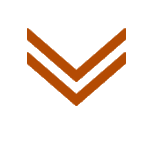
COMING NEXT MONTH
“On the Silk Road with L.C. Swing”
Tashkent, Samarkand and Bokhara in words and pix

LET ME HEAR FROM YOU.
Please take a moment to share your thoughts.
Your comments help make the blog better, and I always answer.

COMING NEXT MONTH
“On the Silk Road with L.C. Swing”
Tashkent, Samarkand and Bokhara in detail

LET ME HEAR FROM YOU.
Please take a moment to share your thoughts.
Your comments help make the blog better, and I always answer.
* * *
If you enjoyed reading this post, I hope you’ll SUBSCRIBE by clicking on the button below. Every month, when I post a new excerpt from my life overseas, you’ll get an email with a link so you can read the next installment. Subscription is free, and I won’t share your contact information with anyone else. Your subscribing lets me know you’re reading what I write, and that means a lot.

